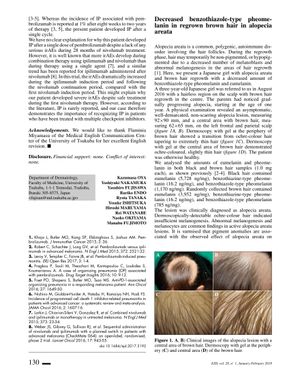Decreased Benzothiazole-Type Pheomelanin in Regrown Brown Hair in Alopecia Areata
January 2018
in “
European journal of dermatology/EJD. European journal of dermatology
”

TLDR The girl's regrown brown hair had less of certain pigments than her original black hair.
The document presented a case study of a three-year-old Japanese girl with alopecia areata who experienced regrowth of brown hair with lower levels of benzothiazole-type pheomelanin and eumelanin compared to her original black hair. The study found that the concentration of eumelanin and benzothiazole-type pheomelanin was about 1.4 and 1.5 times higher in the black hair than in the brown hair, respectively. These results suggest a potential link between the reduced benzothiazole-type pheomelanin and the autoimmune nature of alopecia areata. The study emphasized the need for further research to explore how melanogenesis is altered in alopecia areata by examining a larger number of patients and different hair colors.